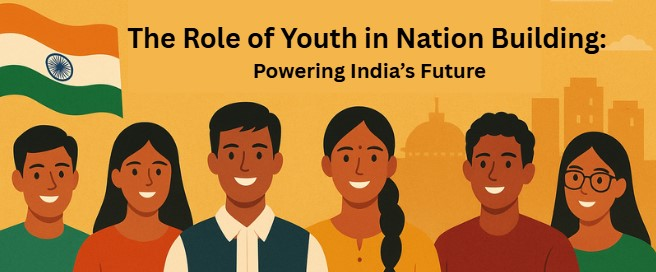The Role of Youth in Nation Building
The Role of Youth in Nation Building: Powering India's Future has always been a defining factor in the growth of any country. In a developing nation like India, where more than 60% of the population is under the age of 35, the youth represent not just the future but also the present driving force of progress. Their ideas, energy, creativity, and determination form the foundation of a strong and vibrant nation. Youth are the real architects of transformation — capable of shaping economic development, social harmony, and technological advancement.
From the freedom struggle to modern-day digital innovation, Indian youth have played a central role in defining the country's direction. In the 21st century, with India emerging as a global power, the involvement of youth in every field — education, politics, entrepreneurship, science, and technology — becomes even more essential. The future of India depends on how effectively this energy is channelized toward nation building.
1. Understanding Nation Building and Its Importance
Nation building refers to the collective effort of citizens and institutions in strengthening a country's political, social, and economic systems. It is not limited to government policies but involves the participation of people in creating a sense of unity, purpose, and progress.
For India, nation building means reducing inequality, promoting education, ensuring justice, and fostering innovation. It requires a balance between tradition and modernization, where citizens work together for the common good. The youth, being adaptable and forward-thinking, are naturally positioned to lead this process.
2. The Power and Potential of Indian Youth
India has one of the youngest populations in the world. According to recent statistics, nearly 65% of Indians are below the age of 35. This demographic advantage gives India a unique opportunity for rapid growth. If properly harnessed, this young population can transform India into a global powerhouse.
The energy of the youth is visible across fields — from startups and innovation to social movements and digital revolutions. Initiatives like Digital India, Skill India, and Startup India are empowering young Indians to contribute directly to national progress.
However, the challenge lies in transforming this potential into performance. This requires quality education, job opportunities, leadership training, and a supportive environment that encourages creativity and social responsibility.
3. Historical Role of Youth in Nation Building
The story of India's progress is incomplete without recognizing the contribution of its youth. During the freedom movement, young leaders like Bhagat Singh, Subhas Chandra Bose, and Chandrashekhar Azad ignited the flame of patriotism among millions. Their courage and sacrifice inspired a generation to fight for independence.
Post-independence, youth continued to shape India's destiny — from the Green Revolution, led by young scientists and farmers, to the Information Technology boom of the 1990s, driven by young professionals. Today, Indian youth are not only contributing nationally but also excelling globally in every field, from technology and business to sports and arts.
4. The Role of Youth in Economic Development
Economic development is the foundation of nation building, and the youth are the most critical drivers of this process. Their innovative mindset, entrepreneurial spirit, and adaptability make them ideal contributors to economic growth.
- Entrepreneurship and Startups: India's startup ecosystem is largely driven by young entrepreneurs. With the government's support through Startup India and Make in India, young innovators are creating jobs, boosting exports, and promoting self-reliance.
- Skill Development: Programs like Skill India are equipping the youth with modern skills for industries like AI, robotics, healthcare, and renewable energy — areas crucial for a sustainable future.
- Employment Generation: Youth-led initiatives in agriculture, manufacturing, and technology are creating employment opportunities, especially in rural areas, helping to reduce migration and unemployment.
5. Youth in Politics and Governance
For any democracy to thrive, active participation of youth in politics and governance is essential. Their engagement brings new ideas, transparency, and accountability to the political system.
India has seen a growing interest among young people in social and political activism. Platforms like social media have empowered them to raise their voices, question authorities, and advocate for change. The entry of young leaders into politics — both at national and state levels — is reshaping public policies and bringing a fresh perspective to governance.
To ensure that this enthusiasm translates into lasting impact, educational institutions and civil organizations must promote civic education and leadership development programs. This helps the youth understand their rights and responsibilities as citizens.
6. Education: The Key to Empowering Youth
Education is the strongest pillar of nation building. It not only imparts knowledge but also shapes the values and character of the youth. Quality education equips young minds with the skills needed for innovation, entrepreneurship, and ethical leadership.
- STEM Education: Encouraging studies in science, technology, engineering, and mathematics helps India maintain its competitive edge in the global economy.
- Moral and Civic Education: Developing moral values, empathy, and social awareness ensures that progress remains inclusive and sustainable.
- Vocational Training: Skill-based learning empowers youth from all backgrounds to contribute effectively to the economy.
With the National Education Policy (NEP) 2020, India is focusing on making education more flexible, skill-oriented, and inclusive — helping students prepare for both local and global challenges.
7. Youth and Technology: Shaping the Digital Future
The youth have been at the forefront of India's digital transformation. With increased internet access and smartphone penetration, young Indians are driving the country's transition toward a digital economy.
- Innovation and Startups: Young tech entrepreneurs are building solutions for real-world problems, from digital payments to healthcare and education.
- Social Impact: Youth-led digital campaigns are spreading awareness about climate change, health, and social justice.
- Global Recognition: Indian youth are leading international technology firms and research projects, showcasing India's intellectual potential.
The combination of creativity, technology, and social responsibility makes young Indians powerful agents of change in the 21st century.
8. Challenges Facing Indian Youth
Despite their potential, Indian youth face several challenges that can hinder their contribution to nation building:
- Unemployment and underemployment due to lack of job opportunities.
- Skill gaps between education and industry requirements.
- Social inequality and poverty, which limit access to resources.
- Mental health issues stemming from stress and competition.
- Political disillusionment due to corruption and lack of representation.
Addressing these challenges requires coordinated efforts between government, private sector, and civil society. Policies must focus on creating inclusive opportunities and promoting mental, social, and economic well-being.
9. The Role of Youth in Social Change
Beyond economic and political development, youth play a vital role in shaping India's social fabric. They challenge outdated norms, advocate for gender equality, environmental protection, and inclusivity.
Youth-led movements like Swachh Bharat Abhiyan, Save the Earth campaigns, and education-for-all initiatives show their commitment to social transformation. Their active participation in NGOs, volunteer programs, and awareness drives proves that they are ready to take responsibility for the country's holistic progress.
10. Empowering Youth for a Better Tomorrow
For India to truly benefit from its demographic dividend, it must invest in empowering its youth. This can be achieved by:
- Providing equal access to quality education and healthcare.
- Promoting entrepreneurship and innovation at the grassroots level.
- Encouraging youth participation in governance and policy-making.
- Creating inclusive spaces for dialogue, mentorship, and leadership.
- Fostering a culture of ethics, empathy, and environmental responsibility.
A strong youth policy, combined with supportive institutions, can ensure that India's youth remain productive, engaged, and visionary.
Conclusion
The Role of Youth in Nation Building: Powering India's Future is not just about participation but leadership. The future of India lies in the hands of its young generation — energetic, creative, and determined to build a progressive nation. They are not merely the beneficiaries of development; they are the creators of change.
By investing in education, innovation, and inclusive opportunities, India can turn its demographic potential into a sustainable advantage. The youth must realize that nation building is not a one-day effort but a lifelong commitment to making India stronger, fairer, and more self-reliant.
With unity, vision, and hard work, today's youth can truly power India's future and place the nation at the forefront of global progress.
UPSC




























































 Copy Link
Copy Link






























